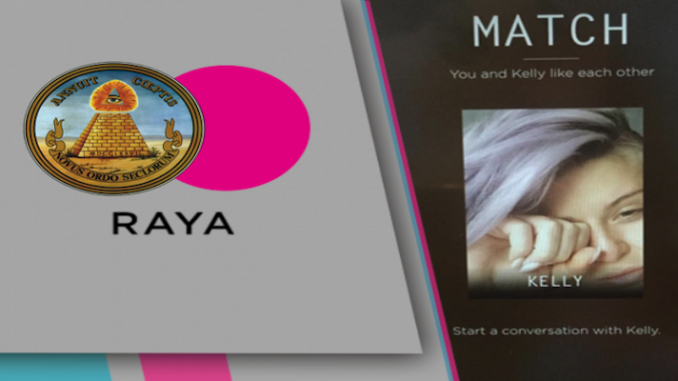
It only makes sense: a dating app for famous people only – and some call it the “Illuminati Tinder“. Alice Hines, a journalist for New York Magazine, decided to take the app for a spin to see what it really was like. The first person’s profile she saw on the dating app was that of a man named Patrick. He was 21 and had a monkey on his shoulder. As Hines writes:
Would you like to see more?the monkey seemed to ask.

BYPASS THE CENSORS
Sign up to get unfiltered news delivered straight to your inbox.
You can unsubscribe any time. By subscribing you agree to our Terms of Use
Latest Video
I pressed a play button and my iPhone filled with a Patrick montage set to music. Watching the procession of photos felt intimate, like FaceTiming a friend, but also creepy, like hacking into someone’s phone. In fact, it was something in-between. Patrick has a last name even your grandmother who’s never used an app would recognize — his dad’s a movie star. But because we’d both been accepted to Raya, we could be chatting in just a few clicks, if we both tapped the heart on each other’s profiles.
The Illuminati Tinder
Raya calls itself “an exclusive dating and networking platform for people in creative industries.” I’ve also heard it called “Illuminati Tinder.” Members are admitted by a secretive, anonymous committee, based in part on their Instagram presence. The result is something like one of those unmarked nightclubs, except it’s in your phone, and peppered with vloggers and net artists in addition to models and Disney stars of yore.
Raya isn’t the first online dating service to try to harness celebrity and status to cultivate an image of exclusivity — its strategy, however, seems shrewder than most. The League, another private dating app, launched last year amid widespread media coverage and $2.1 million in seed money, and has attracted a crowd that’s elite by some standards but blandly corporate by others. Raya, meanwhile, operates quietly. Since it launched in March, it has stayed totally out of the press. The people that gravitate to this are diverse, but also, generally, more (internet) famous than their counterparts on other dating services.
During my three weeks on Raya, I saw pro skateboarders and Sports Illustrated swimsuit models, Dancing With the Stars professional dancers, a YouTube beauty guru, the designer of a streetwear brand popularized by Kanye West, a teen celebrity chef, and Moby. Someone leaked Kelly Osbourne’s Raya profile on Instagram this week, which marked one of the first times the app has been referenced on public social media. One member I interviewed reported spotting Raven Symoné of That’s So Raven and Nev Schulman from Catfish.
I matched with the owner of the Paris nightclub I spent the summer of my 19th year strategizing about getting into, and stumbled upon enough up-and-coming DJs/musicians to program a weekend at MoMA PS1’s Warm Up. There were plenty of non-famous people, too: artists, models, record-label employees, ad execs, photographers. Most had Instagram follower counts starting in the low thousands, or else were young and very attractive. (The app can be tailored to any sexual preference, though members say the crowd leans straight.)
Per the Raya website, applicants are evaluated by an algorithm, which considers “overall Instagram influence, who recommended the applicant, and how many active Raya members follow the applicant on Instagram,” as well as a committee’s vote.
Public figures have dated online before. Hilary Duff and Mariah Careyjoined Tinder and Match.com as part of publicity stunts (which makes stumbling upon one of their profiles feel about as exciting as seeing an ad). In July, Tinder introduced verified profiles, supposedly to help prominent members looking for dates distinguish themselves from fake accounts. The thing is, a blue checkmark isn’t exactly discreet. “People are like, ‘Oh my God, that’s so fucking sad,’” said Amy Schumer of what happens when celebrities date online in an episode of her Comedy Central show. “And you’re like, ‘You’re right, I should die alone.'”
Raya solves the privacy problem through careful curation, as well as its interface: Try to screenshot someone’s profile, and you’ll get an alert threatening to kick you off the network if the photo makes it online. (This makes sense, given that careful control of one’s social-media brand is a prerequisite for admission.) Most of the half-dozen Raya members I interviewed were skittish about publicly discussing the app, and preferred to remain anonymous. Raya’s creators did not respond to requests for comment, and neither did representatives for any of the public figures whose names are cited in this story.
The controlled hush around Raya points to a paradox of internet culture: The more everyone strives for digital fame, the more those who achieve it search for ways to escape. Minimal and slightly retro, Raya’s design insulates participants from the torrent of likes and shares that enabled their admission. Users’ profiles — or “stories” — are series of images set to single tracks of music, a vibe that’s more bar mitzvah slideshow than cutting-edge social network. The members I interviewed all loved the immersive, impressionistic quality. (“The music is a great way to tell if someone is basic,” one artist told me over coffee. “Like, if a girl picks ‘Trap Queen.’”) Instagram handles are hyperlinked within profiles for easy browsing, but you can’t like or comment — if you want to engage, both of you must tap the heart on each other’s Raya profiles and hope for a match.
As one Raya member reviewing the app recently put it, “Tinder has become the dating pool equivalent of riding the city bus.” Raya provides a filter, but is an impeccable social-media presence actually a good indicator of dateability? “If you have a million selfies, I find that somewhat off-putting,” said Molly Berman, an L.A.-based photographer who joined Raya last month and has since deleted the app. Instagram acts as a home for our most aesthetically pleasing experiences — vacations, outfits, food — not those that are necessarily most important, or topics of interest to a date. As my friend Chloe Mackey, an NYC writer and model, put it: “No one will ever find love on Raya. It’s about getting an ego boost.”
Other users see Raya more positively. One L.A.-based fashion and art producer who’s been on five Raya dates this summer (her old average was once every three months) said of her matches: “They all have their shit together, with respectable jobs.” Plus, “every single person on it is legitimately hot.” The general attractiveness of the Raya member pool might provoke self-consciousness, if the interface didn’t make interactions feel so democratic. “You see people who you would never go up to in public,” the friend who invited me said. “But then they match with you and you’re messaging. Or maybe their profile shows up and you decide to reject them. It’s a cool power.”
The biggest risk for Raya, all those I interviewed agree, is overexposure. The artist I met for coffee has already noticed the crowd change since the beginning of July, when he signed up. “The word ‘creative’ is used more loosely. Like, if you’re a lingerie model, are you a creative?” As soon as enough people hear about it, the argument goes, photos will leak, undesirables will show up, and hype will evaporate. “Like a club that starts to offer bottle service.”
There’s one crucial difference: At a nightclub, you can make people check their phones when Kelly Osbourne shows up. On Raya, you can’t.


